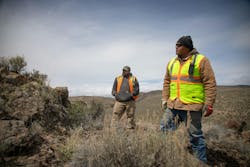DOE Conditionally Approves $2.26B Loan for Controversial Nevada Lithium Mine with “Largest Lithium Reserves in North America”
President Joe Biden’s administration has conditionally agreed to loan more than $2 billion to Canada-based Lithium Americas to build a lithium mine in Nevada. According to the Department of Energy (DOE), the mine is “the largest-proven lithium reserves in North America” – a metal critical to making batteries for EVs, which are key to the President’s renewable energy agenda.
The $2.26 billion conditional loan will be provided by the Department of Energy to help cover Lithium Americas’ costs at its open pit mine and lithium carbonate processing plant, the Thacker Pass mine.
Thacker Pass is located about 200 miles north of Reno and will be deeper than the length of a football field. According to the DOE, the lithium carbonate from Thacker Pass could support the production of batteries for up to 800,000 EVs annually, avoiding the consumption of 317 million gallons of gasoline each year.
The DOE noted that the loan is contingent on the Loan Program Office reviewing the project under the National Environmental Policy Act.
“The United States has an incredible opportunity to lead the next chapter of global electrification in a way that both strengthens our battery supply chains and ensures that the economic benefits are directed toward American workers, companies, and communities,” said Jonathan Evans, President and CEO of Lithium Americas.
However, controversy has surrounded the lithium mine, and environmental groups and Tribal Leaders have spent two years fighting against its approval.
According to Arlan Melendez, Chairman of the Reno-Sparks Indian Colony, the lithium mine will be built at the site where more than two dozen Paiute and Shoshone Native Americans were massacred in 1865. This makes the location a sacred site to the Tribes, and any activity on the land would be considered desecration.
The Tribal Nations also claim that the Federal Government failed to engage or consult with them in a meaningful manner regarding the lithium mine despite a new guidance. The guidance outlines how the Federal Government must work with Tribal Nations as early as possible and give early consideration to improve the protection and accessibility of Tribal sacred sites on federal lands.
Although she didn’t respond directly to the criticism, Interior Department spokeswoman Melissa Schwartz stated there has been “significant communications and partnership with Tribes in Nevada.”
Ultimately, Federal Judge Miranda Du in Reno dismissed these challenges in December 2023, allowing preparations for the lithium mine to progress.
Lithium Americas reported that site preparations have been completed, including all site clearing, the commissioning of a water supply system, and site access and infrastructure improvements.
Mechanical completion of phase one is targeted for 2027, with full production anticipated for sometime in 2028.
About the Author
Breanna Sandridge, Senior Editor
Breanna Sandridge is senior editor for EnergyTech and Microgrid Knowledge, both part of the energy group at Endeavor Business Media.
Prior to that, Breanna was managing editor for Machinery Lubrication and Reliable Plant magazines, both part of Noria Corp. She has two years experience covering the industrial sector.
She also is a 2021 graduate of Northeastern State University (Oklahoma) with a Bachelor's in English.
